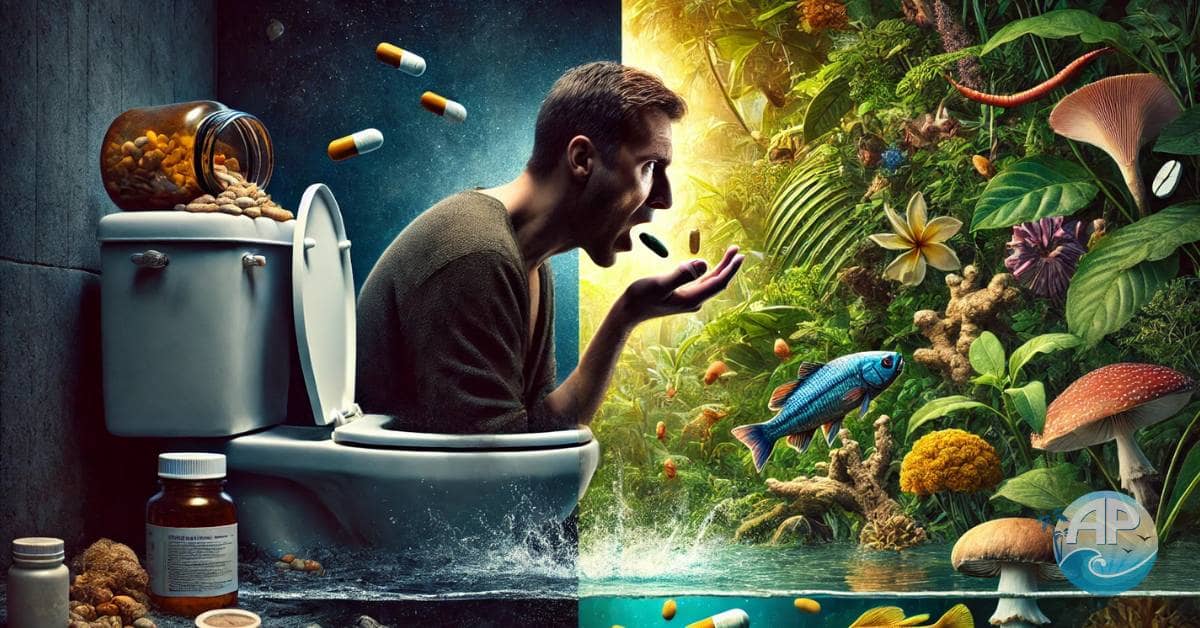If medications are too harmful to flush, why are we still taking them? Let’s explore this unsettling contradiction.
Table of Contents
- Pharmaceuticals Too Toxic to Flush
- Environmental Impact of Meds
- Hidden Ingredients in Medicines
- Health Risks of Pharmaceuticals
- The Profit Motive of Big Pharma
- Natural Remedies & Alternatives
- Conclusion: Rethink Pharmaceuticals
Are Pharmaceuticals Too Toxic to Flush?
Have you ever wondered why health officials caution against flushing unused medications? They label them as pharmaceuticals too toxic to flush, warning that these substances could harm our environment. Yet, every day, we’re encouraged to swallow these same medications. If they’re so harmful to our waterways, why are we ingesting them? This contradiction is both alarming and thought-provoking.
Let’s dig deeper into why this issue matters and explore whether there are healthier alternatives to the pharmaceuticals we consume.
Environmental Impact: Medications and Waterways
Flushing unused medications might seem like an easy way to get rid of them, but it has serious consequences. Once flushed, pharmaceuticals can seep into our water systems, contaminating rivers, lakes, and even our drinking water. Research has found traces of antibiotics, antidepressants, and painkillers in waterways around the world.
How Pharmaceuticals Too Toxic to Flush Contaminate Waterways
When medications enter our water systems, they can cause:
- Hormonal imbalances: Chemicals from birth control pills can disrupt the reproductive systems of fish.
- Antibiotic resistance: The presence of antibiotics in water can contribute to drug-resistant bacteria.
- Bioaccumulation: Toxins from medications build up in fish, which humans then consume.
If these substances are considered pharmaceuticals too toxic to flush, how safe are they for our bodies? For an in-depth look at the issue, explore Big Pharma Symptom Management: Are We Treating Symptoms?.
What’s Really Inside Pharmaceuticals?
Most people trust that the medications they’re prescribed are safe. But have you ever wondered what’s really inside those pills? Many pharmaceuticals are packed with synthetic chemicals, artificial dyes, and preservatives to enhance shelf life and appearance.
Hidden Ingredients Making Pharmaceuticals Too Toxic to Flush
- Artificial dyes: Linked to allergies and hyperactivity.
- Preservatives: Used to extend shelf life but can cause liver damage with prolonged use.
- Fillers and binders: Add bulk to pills but may trigger sensitivities or allergic reactions.
These additives are part of the reason these medications are labeled pharmaceuticals too toxic to flush. Yet, we’re still consuming them. To learn more about the hidden dangers of medications, read Wake Up to Big Pharma’s Lies: How They’re Killing You Slowly.
Health Risks of Toxic Pharmaceuticals
While medications are often necessary, consuming substances that are deemed too toxic for the environment raises concerns about long-term health effects. The side effects of these drugs can be subtle at first but may accumulate over time, leading to serious health issues.
Potential Side Effects of Pharmaceuticals:
- Digestive problems: Many medications can irritate the stomach lining, causing nausea and even ulcers.
- Organ damage: Continuous use can put a strain on your liver and kidneys.
- Cognitive issues: Certain medications have been linked to brain fog and memory loss.
If medications are labeled as too toxic to flush, should we really be ingesting them daily? For practical tips on a healthier lifestyle that reduces dependency on pharmaceuticals, check out Balanced Lifestyle for Better Health: Steps to a Healthier You.
The Profit Motive Behind Pharmaceuticals
Pharmaceutical companies are not solely in the business of healing; they’re driven by profit. The focus is often on symptom management rather than cures, ensuring that patients remain dependent on medications for the long term.
Treating Symptoms, Not Curing Diseases
Pharmaceutical companies benefit from keeping customers on their medications indefinitely. This is why pharmaceuticals too toxic to flush continue to be prescribed, even when natural alternatives could be more effective and less harmful.
If you’re interested in how media influences public perception of health, explore Media Control and Hidden Agendas: The Truth Behind Your News.
Safer, Natural Alternatives
Instead of relying on synthetic medications that carry long-term risks, there are natural remedies that can effectively support your health. These alternatives work with your body’s natural healing processes, unlike pharmaceuticals too toxic to flush. For a deeper dive into the benefits of natural healing, check out our Ultimate Guide to Superfoods & Supplements.
Effective Natural Alternatives:
- Turmeric: A natural anti-inflammatory that supports joint health and reduces pain.
- Ginger: Helps with digestion, reduces nausea, and alleviates pain.
- Medicinal Mushrooms: Adaptogens like reishi and lion’s mane enhance immunity, boost brain function, and reduce stress.
- Redox Molecules: These molecules support cellular repair and regeneration, promoting overall health.
- Omega-3 Fatty Acids: Found in fish oil, these fats reduce inflammation and support heart health.
- Ashwagandha: An adaptogen that reduces stress, balances hormones, and enhances brain function.
- Probiotics: Found in yogurt and kefir, probiotics support gut health, improve digestion, and boost immunity.
- Garlic: A powerful natural antibiotic that lowers blood pressure and improves heart health.
For those interested in adopting a healthier lifestyle, especially in retirement, consider Fit and Free Retirement: Ditch the Grind, Embrace Your Best Years.
Conclusion: Rethink Pharmaceuticals Too Toxic to Flush
The next time you reach for a prescription, ask yourself: If these medications are too toxic to flush, should you really be swallowing them? The pharmaceutical industry has conditioned us to believe that pills are the only solution, but there are safer, more sustainable options available.
Let’s prioritize our health by exploring natural remedies and making informed decisions. By choosing alternatives that align with our body’s natural processes, we can break free from pharmaceutical dependency.



